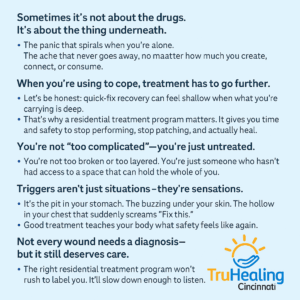Sometimes it’s not about the drugs. It’s about the thing underneath.
The panic that spirals when you’re alone. The ache that never goes away, no matter how much you create, connect, or consume.
You may have started using to take the edge off. Or to feel something in a body that’s gone too numb too many times. But now it’s tangled. It’s not just the symptoms anymore. It’s the story you’ve survived.
This blog isn’t about judging that. It’s about naming it—and explaining why the right kind of help doesn’t stay on the surface.
When You’re Using to Cope, Treatment Has to Go Further
Let’s be honest: quick-fix recovery can feel shallow when what you’re carrying is deep.
You’ve lived through things that left marks. Maybe you don’t even call it trauma. Maybe it was just “normal” in your world.
But your nervous system remembers what your mind learned to minimize.
If your drug use started as a way to manage that—anxiety, hypervigilance, shame—then any treatment that doesn’t address those roots is going to feel like putting a fresh coat of paint on a burning house.
That’s why a residential treatment program matters. It gives you time and safety to stop performing, stop patching, and actually heal.
You’re Not “Too Complicated”—You’re Just Untreated
So many people come into treatment thinking, I’m the exception. It won’t work on me.
Because your trauma doesn’t fit neatly into a box.
Because you’ve been high-functioning.
Because you’ve tried to fix this quietly—on your own terms.
You’re not too broken or too layered. You’re just someone who hasn’t had access to a space that can hold the whole of you.
In cities like Cincinnati or Lexington, we see this every day: people using substances to balance trauma-brain patterns no one ever treated.
And once they get the kind of care that actually sees it?
That’s when things start to shift.
Triggers Aren’t Just Situations—They’re Sensations
One of the most misunderstood things in recovery is what a trigger actually is.
It’s not just walking past a bar. It’s not just seeing someone use.
It’s the pit in your stomach. The buzzing under your skin. The hollow in your chest that suddenly screams “Fix this.”
Good treatment doesn’t just teach you to avoid the bar. It teaches your body what safety feels like again.
Because once you know how to come back to your body without a substance—that’s power. That’s freedom.
Residential programs can provide that level of depth. Not because they’re perfect. But because they give you room to go slow, go deep, and stay supported while you relearn how to feel without fleeing.
Not Every Wound Needs a Diagnosis—But It Still Deserves Care
Maybe no one ever labeled your experience. Maybe you’ve been told you’re “sensitive,” “dramatic,” or “too much.”
And maybe you’ve internalized the idea that others had it worse.
But trauma isn’t about comparison. It’s about what got disrupted in you.
What you had to do to survive. What you’ve had to carry since.
The right residential treatment program won’t rush to label you. It’ll slow down enough to listen. And it’ll help you rewrite the belief that coping means weakness. Coping means you adapted. Now you get to un-adapt—with support.

Your Creativity Isn’t a Liability—It’s a Map
If you’re someone who feels deeply, you’ve probably used that gift to survive.
You’ve written it, painted it, laughed through it, made meaning from it.
A lot of people in creative or emotionally expressive communities worry that treatment will “flatten” them—take away the spark that made them them.
But the truth? Recovery often brings that creativity into focus.
You’re not giving up your spark. You’re learning how to protect it from the burn.
TruHealing Cincinnati offers trauma-informed care that understands this balance. Whether you’re local or looking for a residential treatment program in Louisville, Kentucky, it’s worth finding a program that values your emotional depth as part of your recovery—not something to tame.
The Real Work Doesn’t Start Until You Feel Safe
If no one’s ever said this to you plainly:
You deserve care that understands what you’ve lived through.
Not care that just tells you to “cope better.”
There’s a reason you’re using. And there’s a reason you’re still here—still reading.
You want something more. Not just abstinence. Not just a checklist.
Relief.
Integration.
A way to exist in your own skin without the panic.
And that’s what deeper treatment offers.
Call (888) 643-9118 or visit TruHealing Cincinnati’s residential treatment program to learn how our trauma-informed care can help you go deeper—gently, safely, and without losing yourself.
FAQs: What You’re Probably Still Wondering
Is it normal to use substances to manage anxiety or trauma?
Yes. Many people do—especially those who’ve never had access to effective emotional regulation tools or trauma-informed care. It’s coping, not character failure.
Do residential programs really go deeper than outpatient therapy?
They can. Residential care gives you the time, environment, and therapeutic intensity that’s often hard to achieve in weekly sessions alone. Especially when trauma is involved.
I’m scared I’ll lose my personality in treatment. Is that valid?
Absolutely. Many people feel that fear. But the right program should help you become more yourself, not less. More grounded, more expressive, more clear—not erased.
Can I talk about mental health stuff even if I’m there for substance use?
You should. And if the program doesn’t invite that—keep looking. Programs like TruHealing Cincinnati integrate both, because they know they’re connected.

